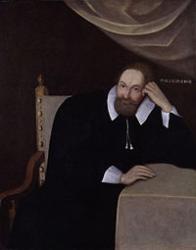1841 - 1931 Hymnal Number: d267 Author of "O Lord of life, and love, and power, How joyful life might be" in The American Hymnal for Chapel Service E. S. A. The initials of Ella Sophia Armitage, née Bulley, daughter of S. M. Bulley, of Liverpool, and granddaughter of T. Raffles, D.D. (p. 948, ii.). She was born at Liverpool, March 3, 1841, and married in 1874 to the Rev. E. Armitage, M.A., now (1891) Theological Professor in the Congregational United College, Bradford. Mrs. Armitage has published: (1) The Childhood of the English Nation; (2) The Connection of England and Scotland; (3) The Education of a Christian Home; and (4) a Service of Song entitled The Garden of the Lord, Lond., Novello, 1881. In the last work there are 16 of her original hymns. Mrs. Armitage's hymns in common use include:—
1. Eternal Love, Whose law doth sway. Holy Matrimony. Written in 1879 for the marriage of George F. Armitage.
2. Except the Lord the temple build. Laying Foundation-Stone of Sunday School. Written at Waterhead, Oldham, in 1875 for the laying of the foundation-stone of a new Sunday school.
3. In our dear Lord's garden. Christ’s love for Children, Written at Waterhead in 1881, and published in The Garden of the Lord.
4. It is the Lord Himself who tends. Christ the Divine Gardener. Written for The Garden of the Lord, 1881.
5. March on, march on, ye soldiers true. Missions. Written at Waterhead, Oldham, circa 1886, for a missionary meeting.
6. Not only for the goodly fruit-trees tall. Christ's care of Children. Written at Waterhead, Oldham, for The Garden of the Lord, 1881.
7. 0 Father, in Thy Father's heart. Holy Baptism. Written for the Congregational Church Hymnal, 1887.
8. 0 Lord of all, we bring to Thee our sacrifice of praise. Sunday School Festival. Written at Waterhead, Oldham, circa 1879, for a Whitsuntide Sunday school festival.
9. 0 Lord of life, and love, and power. Living to God. Written at Waterhead, Oldham, in 1875, for the opening of a new Sunday school, and published in The Garden of the Lord, 1881.
All these hymns are in the Congregational Church Hymnal, 1887; Nos. 2, 8, in the Methodist Free Church Hymns, 1889 ; Nos. 3, 4, in the S. S. Union Service Book for Church & School, 1891; and Nos. 1, 5, and 9 in Hunter's Hymns of Faith & Life, Glasgow, 1889. Taken as a whole, Mrs. Armitage's hymns are exceptionally good.
--John Julian Dictionary of Hymnology, Appendix, Part II (1907)
=======================
Armitage, Ella S., p. 1560, ii., under E. S. A. Since 3892, the following additional hymns by Mrs. Armitage have come into common use:
1. O Lord of Hosts, the fight is long. [Temperance.] Written by request for Horder's Hys. Suppl. to Existing Collections., 1894, No. 1226. It is also in The Methodist Hymn Book., 1904, and Horder's Worship Song, 1903.
2. Praise for the Garden of God upon earth. [Flower Services.] Published in her Garden of the Lord, 1881. It is an unusually good hymn for Flower Services.
3. The day of prayer is ending. [Evening.] Published in Horder's Hymns Suppl., &c, 1894, and hisWorship Song, 1905.
4. Though home be dear, and life be sweet. [Earth not our Home] Written for a Service of Song (not published), and included in Horder's Hymns Supplement, 1894, and his Worship Song, 1905. It is all in The Pilgrim Hymnal, Boston, U.S.A., 1904.
Mrs. Armitage's hymns are becoming widely used, both in America and at home.
--John Julian, Dictionary of Hymnology, New Supplement (1907)
Ella S. Armitage


 My Starred Hymns
My Starred Hymns



